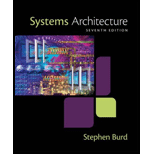
Systems Architecture
7th Edition
ISBN: 9781305080195
Author: Stephen D. Burd
Publisher: Cengage Learning
expand_more
expand_more
format_list_bulleted
Concept explainers
Expert Solution & Answer
Chapter 2, Problem 6RQ
Explanation of Solution
Main memory:
- Main memory is internal to the computer and is also referred to as physical memory.
- Main memory is also known as primary storage or simply memory which contains billions of storage locations.
- It holds
program instructions that are executing currently as well as data processed by these instructions...
Explanation of Solution
Difference between main memory and registers:
| Main memory | Registers |
| Main memory holds the data that will be required for processing. | Registers hold the data that CPU is currently processing. |
| Main memory is the slowest but works fast in a computer... |
Trending nowThis is a popular solution!

Students have asked these similar questions
In the past, encryption and decryption were mostly done by substitution and permutation of letters in a text message. study those classic cryptographic schemes Then, develop an automatic cipher using Javascript The cipher should be able to perform the following tasks:
generate keys
encrypt a given plaintext message with a key selected from the list of keys generated
decrypt a given ciphertext message with a known cipher key
List reasons why teachers should and shouldn’t be replaced by computers? State your response in a descriptive context. Provide five references from the with internet with your answers.
The attached picture shows the RTCAPI memory mapped register which has the address 0x180.
1) Program the MCU's registers so that
a) SIRC is the clock source
b) the clock is divided by 16K
c) the clock is enabled
d) load is enabled
Chapter 2 Solutions
Systems Architecture
Ch. 2 - Prob. 1VECh. 2 - A(n) __________ is a storage location implemented...Ch. 2 - Prob. 3VECh. 2 - A problem-solving procedure that requires...Ch. 2 - Prob. 5VECh. 2 - Prob. 6VECh. 2 - Prob. 7VECh. 2 - Prob. 8VECh. 2 - The major components of a CPU are the __________,...Ch. 2 - A set of instructions thats executed to solve a...
Ch. 2 - Prob. 11VECh. 2 - Prob. 12VECh. 2 - Prob. 13VECh. 2 - A CPU is a(n) __________ processor capable of...Ch. 2 - Prob. 15VECh. 2 - The CPU __________ program instructions one at a...Ch. 2 - Most programs are written in a(n) __________, such...Ch. 2 - Prob. 18VECh. 2 - Prob. 19VECh. 2 - Prob. 20VECh. 2 - Prob. 21VECh. 2 - Prob. 22VECh. 2 - Prob. 23VECh. 2 - Prob. 1RQCh. 2 - What shortcomings of mechanical computation did...Ch. 2 - Prob. 3RQCh. 2 - What is a CPU? What are its primary components?
Ch. 2 - What are registers? What are their functions?
Ch. 2 - Prob. 6RQCh. 2 - Prob. 7RQCh. 2 - Prob. 8RQCh. 2 - How does a supercomputer differ from a mainframe...Ch. 2 - Prob. 10RQCh. 2 - Prob. 11RQCh. 2 - Prob. 12RQCh. 2 - How can a computer system be tuned to a particular...Ch. 2 - What characteristics differentiate application...Ch. 2 - In what ways do system software make developing...Ch. 2 - Why has the development of system software...Ch. 2 - Prob. 17RQCh. 2 - Tables 2.2 and 2.3 will probably be out of date by...
Knowledge Booster
Learn more about
Need a deep-dive on the concept behind this application? Look no further. Learn more about this topic, computer-science and related others by exploring similar questions and additional content below.Similar questions
- What is the ALU result if the 4-bit ALU Control signal is 0100? What happens if the ALU Control signal is 0101?arrow_forwardIn the past, encryption and decryption were mostly done by substitution and permutation of letters in a text message. study those classic cryptographic schemes Then, develop an automatic cipher using a programming language of your choice. The cipher should be able to perform the following tasks: generate keys encrypt a given plaintext message with a key selected from the list of keys generated decrypt a given ciphertext message with a known cipher keyarrow_forwardCase Study Instructions: Offshore Wind Energy in the North Sea For this case study, students will analyze the institutional challenges and social rules surrounding offshore wind energy development in the Dutch North Sea, as explored in the case study from the textbook (pages 44-46). Additional resources in this week’s learning module will provide further perspectives on the impact of wind energy on different stakeholders. Students should refer to the syllabus for specific guidelines regarding length, format, and content requirements. Reflection Questions to Consider: What are the key institutional challenges in implementing offshore wind energy in the North Sea? How do formal and informal social rules shape the use of this shared space? What conflicts arise between different stakeholders (e.g., fishermen, naval transport, military, and wind energy developers)? How can policymakers balance economic, environmental, and social considerations when allocating space for wind energy?…arrow_forward
- Alphabetic Telephone Number TranslatorMany companies use telephone numbers like 555-GET-FOOD so the number is easier for their customers to remember. On a standard telephone, the alphabetic letters are mapped to numbers in the following fashion: A, B, and C = 2 D, E, and F = 3 G, H, and I = 4 J, K, and L = 5 M, N, and O = 6 P, Q, R, and S = 7 T, U, and V = 8 W, X, Y, and Z = 9 Write a program that asks the user to enter a 10-character telephone number in the format XXX-XXX-XXXX. The application should display the telephone number with any alphabetic characters that appeared in the original translated to their numeric equivalent. For example, if the user enters 555-GET-FOOD, the application should display 555-438-3663.arrow_forwardI would like help to resolve the following casearrow_forward7. Character AnalysisIf you have downloaded the source code you will find a file named text.txt in the Chapter 08 folder. Write a program that reads the file’s contents and determines the following: The number of uppercase letters in the file The number of lowercase letters in the file The number of digits in the file The number of whitespace characters in the filearrow_forward
- Provide the full blue terminal commands & output and other things that are usefularrow_forwardHomework You have the row vector (A) that has values from (-100 to 100), write MATLAB codes to: (1) Interchange the first 10 elements with last ten elements. (2) Replace the elements at indices (93,9,17,50) of A with 99. (3) Return the second element and the element before the last of A as a column vector (C1). (4) Extract the first five elements and the last five elements of A and append them as a row vector (R). (5) Set the elements of A with odd indices to zeros(0).arrow_forwardif the error in a closed-loop Servo motor system is zero, why does the motor Contimac ranning instead of stoppingarrow_forward
- When the FCC added Color Television to the Industry Standards, they went with the system developed in the 1940s by Peter Goldman for CBS. Question 15 options: True False Part of the reason that many critics disliked 1950s gameshows was the fact that gameshows offered one of the few opportunities to see unscripted interactions with "real" (average/non-famous) people on television. Question 16 options: True False The Andy Griffith Show is an example of the "rural revival" shows that become enormously popular on 1960s American television. Question 19 options: True False During the Network Era, the hours before primetime each day were exclusively devoted to locally-produced programming, not programming dictated by an affiliate station's parent network. Question 20 options: True Falsearrow_forwardAlthough color television was not added to the industry standard until 1956, CBS had been broadcasting selected special events in color as early as 1950. Question 1 options: True False Two key factors in creating the Network Era of American television were the FCC licensing freeze and ______________. Question 4 options: The Quiz Show Scandals Habitual Viewing Operation Frontal Lobes Drop-In Viewing Least Objectionable Programming was designed to embrace the public service-oriented vision of using television to elevate mass culture and enrich viewers. Question 6 options: True False By the end of the 1950s, all three remaining networks (NBC, CBS, & ABC) were broadcasting their entire nightly programming schedule in full color. Question 9 options: True Falsearrow_forward7. See the code below and solve the following. public class Test { public static void main(String[] args) { int result = 0; } result = fn(2,3); System.out.println("The result is: + result); // fn(x, 1) = x // fn(x, y) = fn(x, y-1) + 2, when y>1 public static int fn(int x, int y) { if (x <= 1) return x; else return fn(x, y-1) + 2; } } 7-1. This program has a bug that leads to infinite recursion. Modify fn(int x, int y) method to fix the problem. (2 point) 7-2. Manually trace the recursive call, fn(2,3) and show the output (step by step). (2 point) 7-3. Can you identify the Base Case in recursive method fn(int x, int y)? (1 point)arrow_forward
arrow_back_ios
SEE MORE QUESTIONS
arrow_forward_ios
Recommended textbooks for you
 Systems ArchitectureComputer ScienceISBN:9781305080195Author:Stephen D. BurdPublisher:Cengage Learning
Systems ArchitectureComputer ScienceISBN:9781305080195Author:Stephen D. BurdPublisher:Cengage Learning Principles of Information Systems (MindTap Course...Computer ScienceISBN:9781285867168Author:Ralph Stair, George ReynoldsPublisher:Cengage Learning
Principles of Information Systems (MindTap Course...Computer ScienceISBN:9781285867168Author:Ralph Stair, George ReynoldsPublisher:Cengage Learning Fundamentals of Information SystemsComputer ScienceISBN:9781305082168Author:Ralph Stair, George ReynoldsPublisher:Cengage Learning
Fundamentals of Information SystemsComputer ScienceISBN:9781305082168Author:Ralph Stair, George ReynoldsPublisher:Cengage Learning Fundamentals of Information SystemsComputer ScienceISBN:9781337097536Author:Ralph Stair, George ReynoldsPublisher:Cengage Learning
Fundamentals of Information SystemsComputer ScienceISBN:9781337097536Author:Ralph Stair, George ReynoldsPublisher:Cengage Learning Enhanced Discovering Computers 2017 (Shelly Cashm...Computer ScienceISBN:9781305657458Author:Misty E. Vermaat, Susan L. Sebok, Steven M. Freund, Mark Frydenberg, Jennifer T. CampbellPublisher:Cengage Learning
Enhanced Discovering Computers 2017 (Shelly Cashm...Computer ScienceISBN:9781305657458Author:Misty E. Vermaat, Susan L. Sebok, Steven M. Freund, Mark Frydenberg, Jennifer T. CampbellPublisher:Cengage Learning

Systems Architecture
Computer Science
ISBN:9781305080195
Author:Stephen D. Burd
Publisher:Cengage Learning

Principles of Information Systems (MindTap Course...
Computer Science
ISBN:9781285867168
Author:Ralph Stair, George Reynolds
Publisher:Cengage Learning

Fundamentals of Information Systems
Computer Science
ISBN:9781305082168
Author:Ralph Stair, George Reynolds
Publisher:Cengage Learning

Fundamentals of Information Systems
Computer Science
ISBN:9781337097536
Author:Ralph Stair, George Reynolds
Publisher:Cengage Learning


Enhanced Discovering Computers 2017 (Shelly Cashm...
Computer Science
ISBN:9781305657458
Author:Misty E. Vermaat, Susan L. Sebok, Steven M. Freund, Mark Frydenberg, Jennifer T. Campbell
Publisher:Cengage Learning